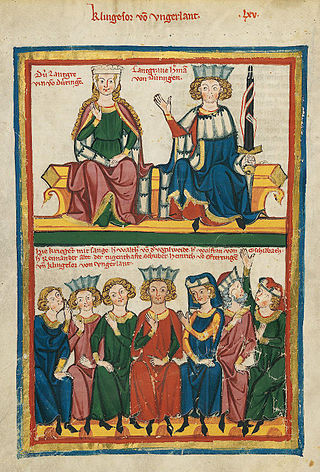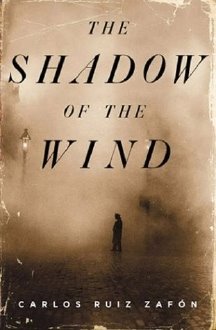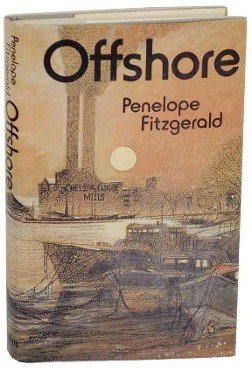
German Romanticism was the dominant intellectual movement of German-speaking countries in the late 18th and early 19th centuries, influencing philosophy, aesthetics, literature, and criticism. Compared to English Romanticism, the German variety developed relatively early, and, in the opening years, coincided with Weimar Classicism (1772–1805).

Georg Philipp Friedrich Freiherr von Hardenberg, pen name Novalis, was a German aristocrat and polymath, who was a poet, novelist, philosopher and mystic. He is regarded as an influential figure of Jena Romanticism.

Penelope Mary Fitzgerald was a Booker Prize-winning novelist, poet, essayist and biographer from Lincoln, England. In 2008 The Times listed her among "the 50 greatest British writers since 1945". The Observer in 2012 placed her final novel, The Blue Flower, among "the ten best historical novels". A.S. Byatt called her, "Jane Austen’s nearest heir for precision and invention."

The London Review of Books (LRB) is a British literary magazine published bimonthly that features articles and essays on fiction and non-fiction subjects, which are usually structured as book reviews.
Dame Hermione Lee, is a British biographer, literary critic and academic. She is a former President of Wolfson College, Oxford, and a former Goldsmiths' Professor of English Literature in the University of Oxford and Professorial Fellow of New College. She is a Fellow of the British Academy and of the Royal Society of Literature.

Heinrich von Ofterdingen is a fabled, quasi-fictional Middle High German lyric poet and Minnesinger mentioned in the 13th-century epic of the Sängerkrieg on the Wartburg. The legend was revived by Novalis in his eponymous fragmentary novel written in 1800 and by E. T. A. Hoffmann in his 1818 novella Der Kampf der Sänger.

The Shadow of the Wind is a 2001 novel by the Spanish writer Carlos Ruiz Zafón and a worldwide bestseller. The book was translated into English in 2004 by Lucia Graves and sold over a million copies in the UK after already achieving success on mainland Europe, topping the Spanish bestseller lists for weeks. It was published in the United States by Penguin Books and in Great Britain by Weidenfeld & Nicolson and Orion Books. It is believed to have sold 15 million copies worldwide, making it one of the best-selling books of all time.

Christiane Wilhelmine Sophie von Kühn was the love interest and eventual fiancée of the German Romantic poet and philosopher Friedrich von Hardenberg, known simply as Novalis. Her image famously appears in Novalis’ Hymns to the Night, a foundational text of the literary movement known as German Romanticism.

The Unconsoled is a novel by Kazuo Ishiguro, first published in 1995 by Faber and Faber, and winner of the Cheltenham Prize that year.

Offshore is a 1979 novel by Penelope Fitzgerald. Her third novel, it won the Booker Prize in the same year. The book explores the emotional restlessness of houseboat dwellers who live neither fully on the water nor fully on the land. It was inspired by the most difficult years of Fitzgerald's own life, years during which she lived on an old Thames sailing barge moored at Battersea Reach.

The Bookshop is a 1978 novel by the British author Penelope Fitzgerald. It was shortlisted for the Booker Prize. The novel was made into a film by Isabel Coixet in 2017.

A blue flower was a central symbol of inspiration for the Romanticism movement, and remains an enduring motif in Western art today. It stands for desire, love, and the metaphysical striving for the infinite and unreachable. It symbolizes hope and the beauty of things.
Transcendental homelessness is a philosophical term coined by George Lukács in his 1914–15 essay Theory of the Novel. Lukács quotes Novalis at the top of the essay, "Philosophy is really homesickness—the desire to be everywhere at home." The essay unfolds closely related to this notion of Novalis—that modern philosophy "mourns the absence of a pre-subjective, pre-reflexive anchoring of reason" and is searching to be grounded but cannot achieve this aim due to philosophy's modern discursive nature.

The Golden Child is a 1977 mystery novel by the British author Penelope Fitzgerald, her first published work of fiction. Written while her husband was terminally ill, and partly for his benefit, the novel offers a satirical version of the 1972 Treasures of Tutankhamun exhibition at the British Museum, and pokes fun at museum politics, academic scholars, and Cold War spying.

Human Voices is a 1980 novel by the British author Penelope Fitzgerald. It relates the fictionalised experiences of a group of BBC employees at Broadcasting House, London, in 1940 when the city was under nightly attack from the Luftwaffe's high explosive, incendiary, and parachute bombs.

The Gate of Angels is a 1990 historical novel by the British author Penelope Fitzgerald. It is set in 1912 at St Angelicus, a fictional Cambridge University college. The novel was shortlisted for the Booker Prize.

At Freddie's is a 1982 novel by the British author Penelope Fitzgerald. The last of her novels drawing directly on her personal experiences, it focuses on an august but shabby London stage school for children, TheTemple. Fitzgerald had herself been a general studies teacher at the Italia Conti stage school. The school in the novel is known as Freddie's after its elderly principal Freddie Wentworth, a character partly based on that of the impresario Lilian Baylis. The book received mixed reviews on its first UK publication, and on its 1985 appearance in the US.

Innocence is a 1986 novel by the British author Penelope Fitzgerald. Set in Italy, it is a comedy of manners concerning the marriage of the young daughter of an old but impoverished aristocratic family, and a young neurologist who has tried to cut himself off from emotion. "Innocence" is the first of a group of four historical novels written by Fitzgerald at the end of her career. It was her first book to be published in the USA.

The Beginning of Spring is a 1988 novel by the British author Penelope Fitzgerald. Set in Moscow in 1913, it tells the story of a Moscow-born English-educated print shop owner whose English wife has suddenly abandoned him and their three children. The novel was shortlisted for the 1988 Booker Prize.

The Means of Escape is a 2000 short story collection by Penelope Fitzgerald, published shortly after her death. It was first issued as a series of eight stories, most of which were first published between 1975 and 1998.


















